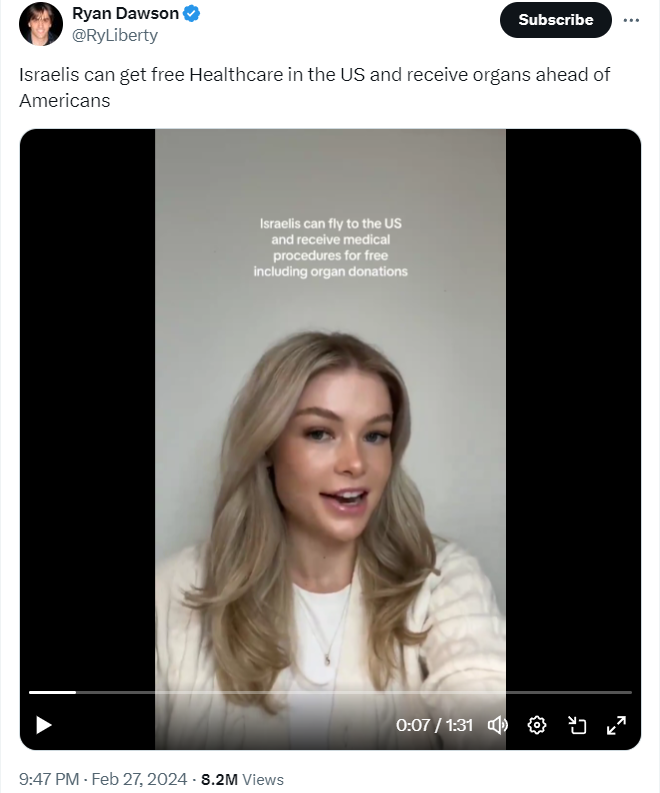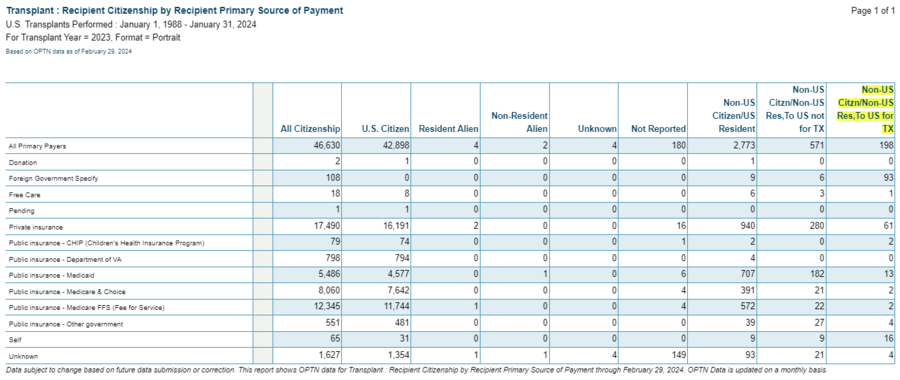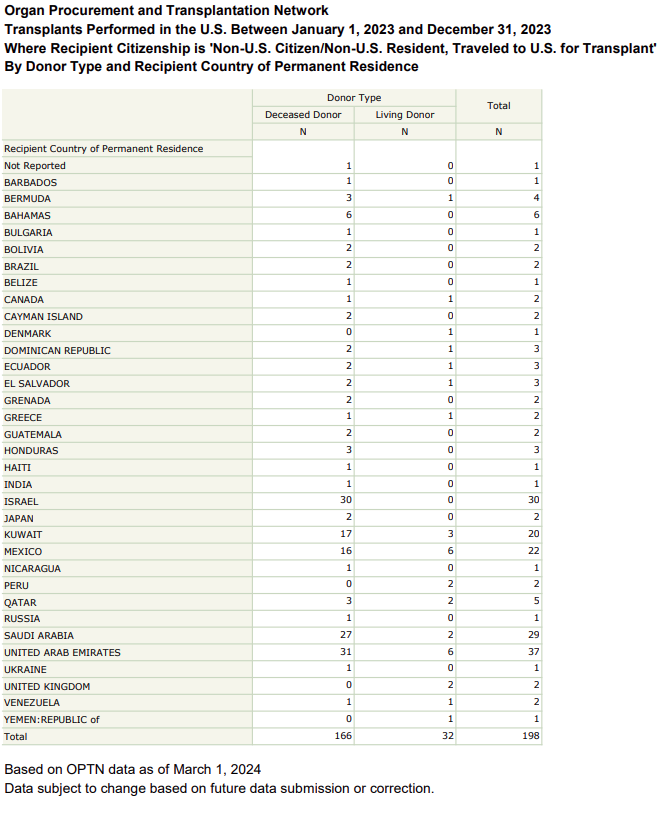STORY UPDATED: check for updates below.

Do Israelis get free healthcare in the United States and receive transplant organs ahead of Americans? No, that's not true: Healthcare in the United States is primarily provided through private insurance or government programs like Medicare and Medicaid. "No US government money can be applied toward medical costs for treatment of a non-US citizen," one expert told Lead Stories. The allocation of organs for transplant is based on medical criteria such as severity of illness, blood type and organ compatibility -- not on nationality.
The claim appeared in a post and video (archived here) on X (formerly Twitter) by Ryan Dawson on February 27, 2024, with the on-screen title "Israelis can fly to the US and receive medical procedures for free including organ donations." The post's caption said:
Israelis can get free Healthcare in the US and receive organs ahead of Americans
This is what the post looked like on X at the time of the writing of this fact check:
(Source: X screenshot taken on Fri Mar 1 15:45:30 2024 UTC)
The video
The 91-second video opens with a woman in scrubs, who is said to be a travel nurse. It then quickly shifts to another woman who lays out her case that Israelis are getting free healthcare in the United States and receive organs for transplant ahead of Americans. Here's a partial transcript of the video:
Purported travel nurse: Come to the U.S. and receive our organs.
Narrator: OK, this is actually insane. I don't think we realize how connected the U.S. and Israel are. Not only does the U.S. give Israel billions of dollars every year that helps fund their free health care, meanwhile Americans do not receive free health care in the U.S.
But that was just a travel nurse who worked on (a hospital's) organ-donation floor in the U.S., and she said that what she learned, like, through her experience working on that floor was that Israelis can come to the U.S. for free and receive any medical procedure if the hospital in the U.S. is better or offers something that they can't get in Israel. Or if they need an organ donation, they can receive American organ donations, and they can come to the U.S. and everything's paid for. Their flight's paid for, their hospital stay and their medical procedure, everything is free ...
The video provides no evidence to support its claim other than stating that an unidentified "travel nurse" made the observations mentioned in the clip. (A full transcript of the video may be read here.)
What legal experts on health care say
Wendy Parmet, a Northeastern University School of Law professor and director of the school's Center for Health Policy and Law, told Lead Stories in a March 1, 2024, email that "I do not know of any special programs for Israeli citizens" to receive healthcare in the U.S. Parmet said there are many variables for receiving U.S. medical care:
This depends upon their immigration status, passport, income, and what state they are in. If they are dual citizens, they may be eligible for Medicaid or other federal programs just like other US citizens. If they are non-citizens, it depends upon whether they have a green card, are refugees, or undocumented. It also depends upon the state they are in. Some states are more generous to non-citizens than the federal government. The rules are very complicated.
In another March 1, 2024, email, Polly Price, professor of global health at the Emory University School of Law, told Lead Stories that the U.S. Immigration and Nationality Act (INA) covers such situations. She said (emphasis ours):
There is a visa category for non-citizens seeking to come to the US for medical treatment. These must be applied for, typically at the US embassy where the non-national is located. A charitable hospital within the US can begin the application process for that person from within the US, I think. But no application is automatically granted, based on nationality or otherwise.
Further, the application for a medical visa must prove that there are sufficient funds to pay for the expected treatment in the US. A charity within the US can guarantee that medical costs will be covered.
Otherwise, it is the applicant's responsibility to show that payment has been arranged. Nothing prevents a charity or governments outside the United States supplying the financing, or self-funding by Saudi princes, for example. But what is absolutely clear is that no US government money can be applied toward medical costs for treatment of a non-US citizen. ...
Non-citizens are excluded from Obamacare. There may be an exception for green card holders, but they would have to pay to get insurance under the Affordable Care Act. No non-citizens get free healthcare.
Transplant list
Anne Paschke, a media relations specialist with the United Network for Organ Sharing (UNOS), a nonprofit that runs the U.S. Organ Procurement and Transplantation Network, told Lead Stories in a March 1, 2024, email that specific nationalities are not fast-tracked to the top of the transplant waiting list. She said:
The only way any patient can be added to the transplant waiting list in the United States is to be evaluated and added by a transplant hospital in the United States or Puerto Rico.
Organs are allocated based on medical urgency, biological matching between donors and recipients, waiting time and other medical and logistical factors. Social factors are not considered.
The UNOS FAQ web page goes into greater detail.
Additionally, the Organ Procurement and Transplantation Network (OPTN), which manages organ transplants in the United States, has a specific policy dealing with the "Registration and Transplants of Non-US Citizens/Non-US Residents." Beginning on page 307, it says:
17.1.A Referrals
Members may not enter into contracts with foreign agencies or governments for the transplant of non-US residents/non-US citizens. Members may negotiate the terms and conditions under which any individual candidate would be treated with the understanding that each candidate must be referred on a case-by-case and physician-to-physician basis.
17.1.B Review of Non-US Citizens/Non-US Resident Registrations and Transplants
The Ad Hoc International Relations Committee will review all citizenship data reported to the OPTN. The Ad Hoc International Relations Committee may request that transplant hospitals voluntarily provide additional information about registrations or transplants of non-US citizens/non-US residents.
17.1.C Report of Activities Related to The Transplantation of Non-US Citizens/NonUS Residents
The Ad Hoc International Relations Committee will prepare and provide public access to an annual report of transplant hospital activities related to the registration and transplantation of non-US citizens/non-US residents.
Paschke provided a chart to Lead Stories that shows transplant data from OPTN for 2023 by citizenship and source of payment. Of the 46,630 people receiving organ transplants, only 198 were non-U.S. citizens/non-U.S. residents (highlighted in yellow below). Of that total, 93 of the transplants were paid for by foreign governments, 61 by private insurance, 16 by the patient and the remaining 28 by public insurance in the United States, which included Medicare, Medicaid and the Children's Health Insurance Program, or were unknown. The data did not include a breakdown by nationality. The chart appears below:
(Source: UNOS via OPTN on Fri Mar 1 2024 UTC)
By any measure, a tiny fraction of people who received organ transplants in the United States in 2023 were non-U.S. citizens/non-U.S. residents; likely, an even smaller number would be Israelis.
In a March 4, 2024, email, Paschke provided updated details saying, "The attached chart shows that 30 of the 198 recipients from 2023 who came to the US for a transplant were from Israel."
The second chart appears below:
(Source: UNOS via OPTN on Tue Mar 5 2024 UTC)
Read more
Other Lead Stories fact checks of claims related to Israel can be found here.
Updates:
-
2024-03-05T19:48:01Z 2024-03-05T19:48:01Z Adds context from Anne Paschke, a media relations specialist with the United Network for Organ Sharing, who provided additional details in a March 4, 2024, email. -
2024-03-02T00:32:08Z 2024-03-02T00:32:08Z Transcript link added




















